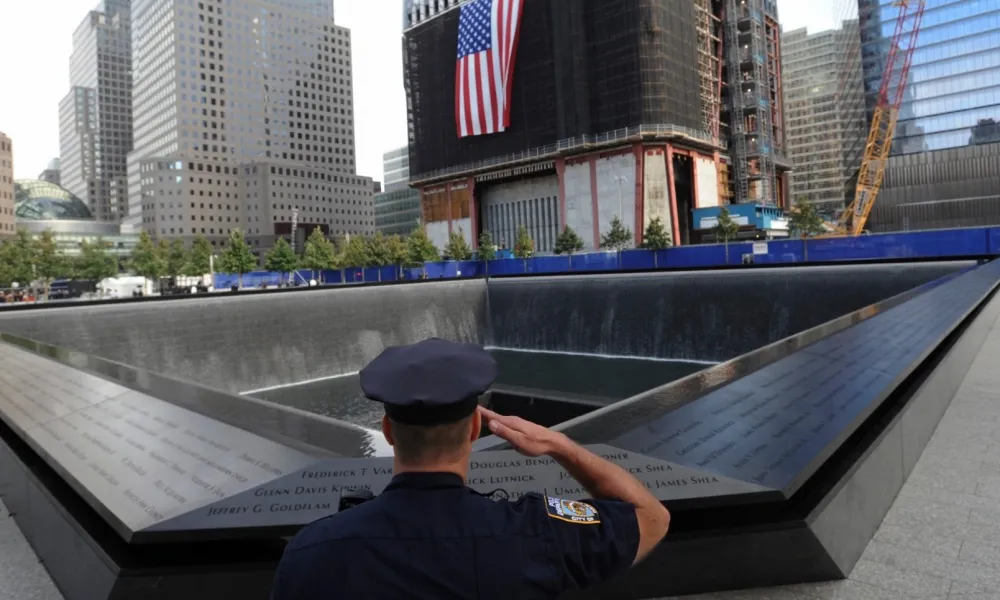News
Poll: Age is a bigger influence than political affiliation when it comes to Americans’ views on 9/11

Yesterday marked the 21st anniversary of 9/11 and many Americans share the same feelings as those across the political aisle.
A recent poll has shown that younger Americans don’t have as strong a connection to the event and don’t possess the same unity as older citizens do, according to a new poll by More In Common in partnership with YouGov.
The poll also found a subtle difference in the outlook when it came to patriotism, safety and Islamophobia following the 9/11 attacks. Fifty-seven percent of U.S. adults, including 72% of Democrats and 50% of all other Americans, said they associate the post-9/11 period with Muslim Americans being discriminated against.
However, 73% of adults, including a sizeable number of Democrats and Republicans, remember the time fondly and say it was a time when America was united. In an equal polling, 63% Democrats and Republicans associate the era with politicians on both sides of the spectrum working together.
However, those numbers dropped for younger Americans. While over half of seniors described America post 9/11 as “united”, only 22% of millennials and 21% of Gen Z adults said they would choose “united” to describe that period.
When asked if 9/11 changed their lives, 56% of respondents, including 60% of Democrats and 63% of Republicans, said that it did.
59 percent of millennials, who were between the ages of 5 and 20 in 2001, answered yes — a rate higher than Gen Z (37%), Gen X (54%) and the Silent Generation (56%). Only Baby Boomers (61%) were more likely to say the event changed their lives.
When asked what Americans are supposed to “never forget” about 9/11, clear majorities of Republicans and Democrats noted the victims and their families, and the heroic responses and sacrifices made by first responders. However, when it came to millennials and Gen Z adults, they were more likely to answer “I don’t know.”
“9/11 remains one of the most significant events many Americans have experienced,” said Dan Vallone, director for More in Common USA. “But it is receding into history for younger Americans.
“We need to involve younger Americans more in the process of creating memories and lessons from 9/11. If we want to try and build stronger shared memories of the attacks and what we should learn from them, it will not be enough to tell younger Americans about that period, from the vantage point of older Americans,” he said.
This year’s anniversary of the attacks comes just a few weeks after one of the 9/11 museums in Lower Manhattan ceased trading for good. The National September 11 Memorial & Museum are still open.
Terry A. Hurlbut has been a student of politics, philosophy, and science for more than 35 years. He is a graduate of Yale College and has served as a physician-level laboratory administrator in a 250-bed community hospital. He also is a serious student of the Bible, is conversant in its two primary original languages, and has followed the creation-science movement closely since 1993.
-

 Accountability3 days ago
Accountability3 days agoWaste of the Day: Principal Bought Lobster with School Funds
-

 Executive1 day ago
Executive1 day agoHow Relaxed COVID-Era Rules Fueled Minnesota’s Biggest Scam
-

 Civilization8 hours ago
Civilization8 hours agoWhy Europe Shouldn’t Be Upset at Trump’s Venezuelan Actions
-

 Constitution2 days ago
Constitution2 days agoTrump, Canada, and the Constitutional Problem Beneath the Bridge
-

 Civilization1 day ago
Civilization1 day agoThe End of Purple States and Competitive Districts
-

 Christianity Today7 hours ago
Christianity Today7 hours agoSurprising Revival: Gen Z Men & Highly Educated Lead Return to Religion
-

 Civilization5 days ago
Civilization5 days agoThe devil is in the details
-

 Executive20 hours ago
Executive20 hours agoWaste of the Day: Can You Hear Me Now?



This is not surprising. Those who were born after or just before 9/11, in many cases, did not experience it in the way those there did or those alive did.